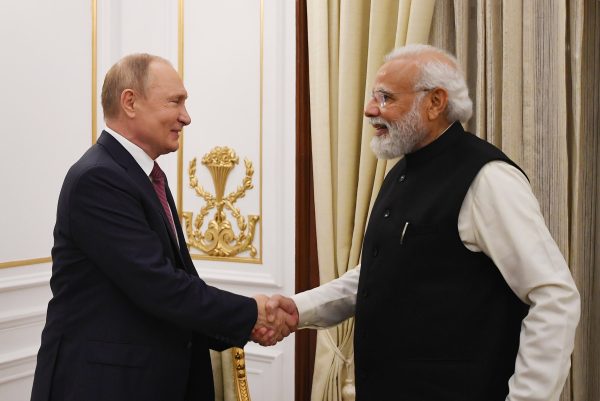
Russian President Vladimir Putin visited India in the first week of December. The visit was significant in part because Putin has not traveled abroad to attend recent summits in person, like the G-20 in late October in Rome and COP26 in Glasgow, Scotland in November. Putin did go, however, to India for the 21st Annual India-Russia Summit with Indian Prime Minister Narendra Modi. The Russian president appears to have wanted to establish that Moscow can handle the India and China relationships independently of each other. Putin’s visit is seen as an effort to repair the damage done to the relationship over the last couple of years, as Russia and India drifted apart.
Going by the optics and the number of memoranda of understanding (MoUs) and agreements signed by the two countries, Putin’s India visit has attempted to bring back some balance in the relationship. A statement from the Indian Prime Minister’s Office stated that the two leaders expressed “satisfaction at the sustained progress” in their bilateral relationship characterized as the “Special and Privileged Strategic Partnership.” The two countries also held the inaugural round of a 2+2 Ministerial Dialogue involving the defense and foreign ministers of India and Russia. The Inter-Governmental Commission on Military & Military-Technical Cooperation also held a meeting during the visit.
Despite all the fanfare, it is not clear if India and Russia have managed to address the important contradictions in their bilateral relationship. The 99-point joint statement following the summit meeting highlighted a number of key areas for advancing bilateral cooperation in areas including civil nuclear and space, defense, transport and connectivity.
For Russia, China has become its go-to all-round strategic partner especially against the backdrop of Moscow’s isolation from the West. But for India, China has become a primary threat, as the late Indian Chief of Defense Staff Gen. Bipin Rawat stated recently. This has necessitated that India develop closer strategic partnerships with the U.S. and others, like Australia and Japan, which share similar threat perceptions about China. This has created wrinkles in the India-Russia relationship, despite their close bilateral relations, as well as trilateral engagements such as the Russia-India-China (RIC) grouping and broader engagements such as through the BRICS and Shanghai Cooperation Organization (SCO). It is unclear if these India-Russia engagements will be sufficient to iron out the wrinkles that have come to the surface.
India-Russia differences in recent times over developments in the Indo-Pacific and China have become a significant limitation in India-Russia relations. That their annual summit meeting was cancelled in 2020 was a reflection of the difficulties facing their decades-old relationship. The Indian Ministry of External Affairs said that the summit was cancelled on account of the COVID-19 pandemic, but given that other international summits and meetings were being held virtually in 2020, the explanation for the complete cancellation was not entirely convincing.
Indeed, there was an Indian news report at the time which said that the summit did not take place due to “severe reservations [from Moscow] on New Delhi joining the Indo-Pacific initiative and Quad.” These difficulties in the relationship had come out in the open with Russian statements and Indian counter-statements. Russian Foreign Minister Sergei Lavrov has been quite open about his views on India’s Indo-Pacific policy and Quad engagement, as he was at the annual Raisina Dialogue in January 2020. Later in the year, he again stated at a general meeting of the Russian International Affairs Council in December that “India is currently an object of the Western countries’ persistent, aggressive and devious policy as they are trying to engage it in anti-China games by promoting Indo-Pacific strategies, the so-called ‘Quad’ while at the same time the West is attempting to undermine our close partnership and privileged relations with India.”
In reply to this statement, the usually cautious Indian Ministry of External Affairs responded by saying that India has always maintained an independent foreign policy, which is premised on its own national interests, and that India’s Indo-Pacific approach was not focused on any particular country. India also added that its foreign relations with a particular country stand independent of its relations with other countries, and that it must be understood as such.
While the political differences are one set of problems, the Russian sale of advanced weaponry and major defense platforms to China are another source of worry to India. Over the last few years, Russia has sold China advanced Kilo-class submarines as well as Su-35 fighter jets which could change the military balance in favor of China in significant ways.
Despite these challenges, during Putin’s visit India and Russia signed 28 MoUs on several different areas including cooperation on outer space, defense, and energy security involving government departments and commercial organizations of both countries. Among the agreements and MoUs signed during the visit was an existing agreement for the joint production of around 600,000 AK-203 assault rifles at a manufacturing facility in the north Indian state of Uttar Pradesh and an extended pact on military cooperation for 10 years from 2021 to 2031. Despite the fact that India has been trying to diversify its defense trade partners, Russia continues to be an important player, maintaining a dominance of about 70 percent of the Indian defense inventory.
That India went along with the S-400s from Russia, despite the threat of Countering America’s Adversaries Through Sanctions Act (CAATSA) sanctions, must have been welcoming to Putin and brought some reassurance about the endurance of the India-Russia relationship. Nevertheless, the contradictions in the relationship on account of the China factor may be difficult to overcome. These problems could become even more serious if the crisis in Ukraine further distances Russia from the West.
Why Did Russian President Putin Visit India?
Source: Frappler

0 Comments